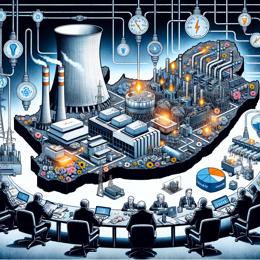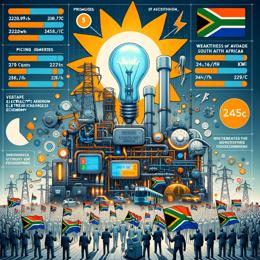Image created by AI
South Africa Faces Stage 13 Load-Shedding Threat as Eskom's Power Plants Decline
South Africa's power utility, Eskom, is on the cusp of a major breakdown that could plunge the country into the darkest depths of load-shedding yet experienced. The stark warning of a potential stage 13 power outage comes from an analysis by VGBE Energy, German experts in coal-fired power generation.
The National Treasury's decision to bring in outside expertise has shed light on the severe state of Eskom’s infrastructure. The VGBE Energy team conducted an exhaustive, plant-by-plant inspection over four and a half months, revealing a worrying truth about the nation's most significant power stations. The experts, with years of experience in the coal power sector, presented a diagnosis that could very well shape South Africa's power stability in the coming years.
At the heart of the crisis are the water treatment plants that serve the coal-fired power stations. The condition of these facilities is dire, especially the one catering to the Medupi and Matimba stations. With an urgent requirement for maintenance and upgrades flagged, the consequences of inaction could be catastrophic. A failure here would instantly strip 9,800 MW from the grid.
The Kendal station's water treatment plant echoes a similar emergency, needing an immediate overhaul to prevent a further loss of 3,840 MW. Combined, these potential failures spell the risk of 13,640 MW disappearing, triggering stage 13 load-shedding—a scenario never before confronted in South Africa.
Eskom's Kusile Power Station, often viewed as the silver lining, carries its own set of pressing concerns. Its contribution is severely limited by incomplete coal handling systems, water supply challenges, and ash discharge issues. With these restraints, it's projected that Kusile can only push 2,400 MW to the grid, half of its envisioned capacity.
The report forms an urgent call to action for Eskom and the South African government to prioritize the repair and upgrading of these critical water treatment facilities. Without rapid intervention, the country could face power cuts of an extreme nature, disrupting the economy, essential services, and daily life for millions.
This dire forecast places a spotlight on the operational integrity and sustainability of Eskom's infrastructure and underscores the necessity for comprehensive upgrade strategies to avoid a full-scale energy crisis.
What remains clear is that the time for mere band-aid solutions is past. The country now stands at a crossroads, where decisive and transparent action will be the only way forward to keep the lights on in South Africa.










